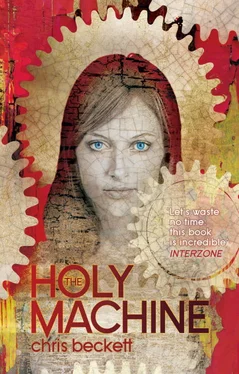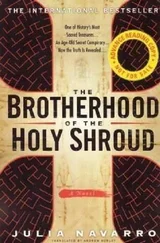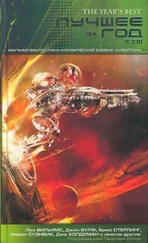But Da Vera argued that every Illyrian from Ullman downwards did still believe in spirit and would not be able to function without that concept – even if it wasn’t given that name. He demonstrated this point with common English expressions such as ‘the spirit of the law’ (as opposed to the ‘letter of the law’) which Ullman and others had regularly used in speeches. ‘Spirit’ referred to the attributes which things possessed as wholes and which transcended the sum of their parts.
‘And once we accept the idea of wholeness,’ Da Vera said, ‘we are a mere step aware from the idea of holiness, which derives from the same etymological root.’
Tame and commonplace as this might sound, it was strong stuff for an Illyrian audience at that time.
I have to admit that at this point I lost the thread of his argument because I had more immediately pressing things on my mind. I had made my mind up that I ought to ask Marija to have a drink with me afterwards. But the idea of actually speaking any such words made me almost physically sick. I spent the entire second half of the meeting rehearsing and discarding one sentence after another in my mind.
‘I wondered, Marija, if you would like a…’
‘Have you got anything on, Marija, or do you fancy a…’
‘Marija, I thought I’d have a glass of wine before I went home and I wondered…’
‘Do you know any good bars in this part of town, Marija? I was just…’
Meanwhile Da Vera finished speaking and invited comments. A discussion of some sort followed in which Marija played a part. And then the meeting ended.
‘That was very interesting didn’t you and I was wondering if you’d like to have a bar with me…’ I said to Marija.
‘Sorry?’
(I had omitted to get her attention before I started to speak.)
‘I did wondering you would drink?’
‘A drink?’ She smiled. ‘Well… I’d like to, but I’ve got something else on…’
‘Yes of course, sorry…’
I rushed away.
‘See you at the next meeting perhaps?’ she called after me.
At the door someone pushed a leaflet into my hand and I glanced back at Marija. She had gone across to the speaker, Da Vera, put her arms round him and given him a kiss.
Well who cared? What did it matter? Why did I need anyone? I was hurrying through the streets, dodging between cars, looking at no one. There was no stopping me. I was in the Night Quarter, I was inside the red room with the sleepwalkers and the dreamy half-human voices that crooned baby, baby, baby love…
Lucy was wearing a short, sleeveless denim dress and dangly earrings, sitting on a sofa with her bare legs curled up underneath her. I headed straight for her. She smiled at me and started to get up. I felt wonderfully empty, as if I was made of air…
‘Would you like to come upstairs with me?’
I nodded. Her smile broadened, seemingly with pure delight.
‘I’m afraid my room’s a bit of a tip,’ she said. I noticed that her speech was British, with a faint regional burr.
‘What’s that accent?’ I croaked.
‘Wiltshire,’ she said, ‘It’s in the south of England. My dad was a postmaster there.’
She glanced at me, smiling almost mischievously, as if acknowledging the absurdity of this life story with which she’d been provided along with her vat-grown human flesh.
We crossed the landing and she opened a door. It was a student’s room: a single bed, a desk, a computer, a reading lamp, a couple of mugs, a jar of freeze-dried coffee, some underwear draped over the back of a chair, a half-finished bottle of red wine… There was even a shelf of discs and books, though the books seemed to have been bought at random from some second-hand place and had no coherent theme: History of Western Thought , Pygmalion , The Cell Biology of Plants , Science Fiction in the Twentieth Century , Principles of Self-Evolving Cybernetics , The Song of Wandering Aengus , Byron in the Balkans….
Lucy handed me a kind of menu that lay on the bedside table, next to an edition of Dickens.
‘Is there anything special you want?’
I swallowed. ‘No. Just for you to undress and… kiss and…’ She nodded and smiled. Briefly she took my left hand and ran her thumb over my credit bracelet. (Her thumb contained a barcode reader, invisible to the naked eye). Then she put her arms round me and kissed me quickly and warmly on my lips before standing back and slipping off her dress, leaving nothing on but the dangly earrings.
It was the first time I’d ever been kissed.
Back at the apartment Ruth was having one of her bright and cheerful evenings. She had been busy with cooking and domestic tasks. She was full of brittle chatter.
‘I saved a steak for you George. Do you want it? This will amuse you. We’ve got a new receptionist at the lab. She’s a syntec. I guess the professor thought we needed to have an example of our products.’ (Ruth worked in a laboratory where they cloned living tissue). ‘She really is totally indistinguishable from a human being. In fact the professor did a little experiment. He actually introduced her as if she was a real person and we were all fooled. It was really extraordinary! I wonder how they manage to programme in all those expressions and gestures and tones of voice so accurately?’
I poured myself a large drink. I didn’t know what I was feeling. I was shaken and rather appalled by what had happened earlier with Lucy. But I knew I would soon go there again.
‘They don’t programme every muscle movement individually,’ I said, quoting the TV programme which had first shown me Lucy. ‘It’s more like making a video. They get actors to perform a repertoire of gestures and expressions, then make a copy. It changes gradually as the SE loops throw in small random variations…’
The alcohol hit my bloodstream. I was suddenly enormously hungry. I told Charlie to heat up the steak.
‘It’s only when you see her trying to pick up a pencil or something like that you can see, you know, that slight clumsiness that robots have,’ Ruth said, following behind me, ‘Do you know what I mean? Like Shirley? But her skin is perfect. I wouldn’t mind skin like that myself. And she’s very pretty. The professor can’t take his eyes off her…’
I turned on the TV, loudly. Big blasphemy trials were going on in Germany. There was talk there of bringing back the death penalty by burning.
The old X3 brought me in my steak.
‘Yet another from the City,’ the taxi-driver observed as we lurched and bumped along the potholed road from the airstrip into the mountain town of Ioannina. Throughout the eastern Mediterranean, Illyria was known then as ‘the City’, just as imperial Byzantium had been known in times past.
The driver introduced himself as Manolis. He stuck a fat roll-up into his mouth and lit it. It crackled like a bonfire.
‘I have had many people from the City in my car. Some come to stare, some to escape, some to buy things that the City can’t sell them…’
He glanced knowingly at me in his mirror, ‘Whatever it is they want, I always do my best to oblige.’
‘I’m here on business,’ I told him, and gave him the name of the hotel by the lakeside where I would be staying.
‘Ah yes,’ he said, ‘on business. You’re all coming here on business now. But perhaps you’ll have time for a look around? I can show you around. A whole day, however many kilometres you want: four hundred drachmai.’
Illyrian diplomacy about that time was trying to develop a ring of comparatively moderate client states around Illyria itself, by strengthening the hands of various more pragmatic factions through trade and the judicious supply of arms. One of these client states was Epiros, the fiefdom at that time of one Archbishop Theodosios who had his capital at Ioannina. An Illyrian government delegation was here to talk trade with him, but the interpreter had become ill, and I’d been hired from Word for Word as a last minute replacement.
Читать дальше












